This Vegetable Lo Mein is an authentic family recipe made with silky noodles stir-fried with bok choy, cabbage, carrots and red bell peppers paired with a savory Asian-inspired sauce! So easy to make at home in under 30 minutes in just one pan. Gluten-free and includes grain-free, low carb, keto, vegan and paleo options.
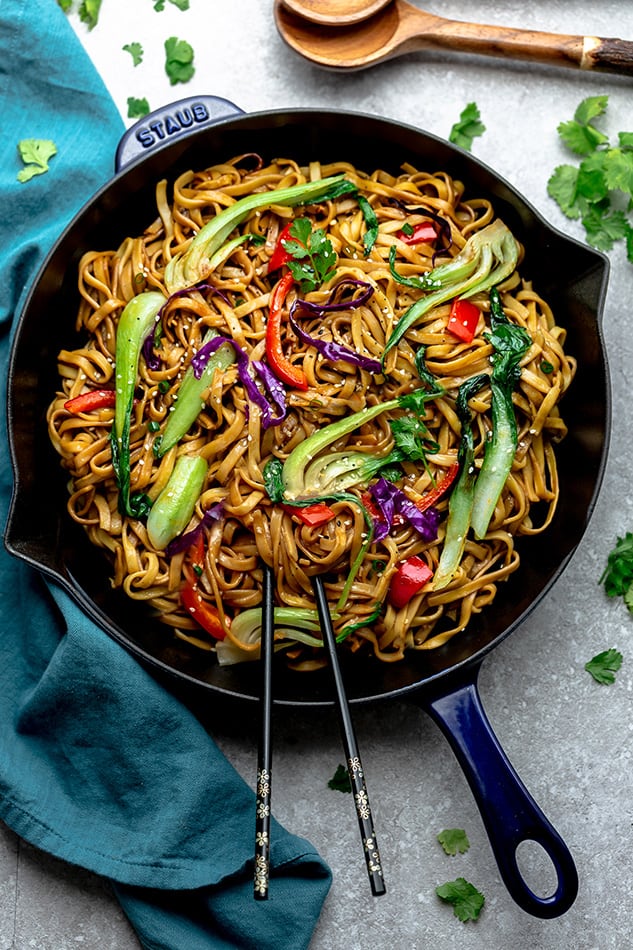
Pin HERE for later and follow my boards for more tasty Asian recipes
Updated April 2021
Healthy Vegetable Lo Mein Recipe
This delicious and Vegetable Lo Mein is one of our favorite takeout style dishes! It reminds us of the best Chicken Lo Mein my dad used to make while we were growing up. We loved all of his traditional Chinese restaurant dishes such as Chicken Chow Mein and Easy Fried Rice. This Veggie Lo Mein is an easy recipe that is super versatile and simple to make in about 30 minutes.
Why you’ll love this easy veggie stir-fry
We love that this stir-fry recipe can be made gluten-free, Whole30, with paleo options. This noodle recipe is super interchangeable meaning that the protein and vegetables can easily be swapped out and customized to fit any needs. If you are looking for a healthy dinner recipe that is super easy to make with a handful of vegetables, then you’re going to love to cook this one.
What is lo mein?
Lo mein is a traditional recipe found in most Chinese restaurants and cultures. Traditionally, chicken and vegetable lo mein is served with noodles and vegetables like snow peas and carrots. All of the ingredients are combined in a savory sauce that is mixed with sesame oil and and tangy yummy flavors.
Difference between Lo Mein vs Chow Mein
Both chow mein and lo mein are stir-fried noodle dishes. The main difference is the type of noodles.
Cantonese Chow Mein uses thin crispy egg noodles. You’ll find that many authentic Chinese restaurants in Hong Kong also shape the noodles into a bird’s nest and deep fry / flash fry the noodles so you get that crispy noodle texture while Lo Mein typically is made with wider yellow noodles.
What noodles are best for Veggie Lo Mein
- For this veggie lo mein recipe, you can use fresh lo mein noodles or dried egg noodles.
- Fresh noodles are usually found in your local Asian market. Some large grocery stores carry it in the International / Ethnic section or refrigerated section.
- Dried ramen noodles, yakisoba noodles or regular / gluten-free spaghetti or fettuccine pasta would also work. Just be sure whatever noodles you use, they measure out to about 6-8 ounces (about 225 grams – 2 cups) when cooked.
- For grain-free diets these can be swapped with Jovial Grain-Free Cassava Spaghetti Pasta , Cappello’s Grain Free Spaghetti Almond Flour Pasta or Palmini Noodles made from Hearts of Palm Pasta. Vegetable noodles work, too, like cooked spaghetti squash noodles or these zucchini noodles for Whole30 Vegetable Lo Mein.
Ingredients in Lo Mein
For the stir fry lo mein
- Fresh Egg Noodles – usually found at Asian supermarkets. You can also swap with ramen noodles or spaghetti noodles. For grain-free diets these can be swapped with Jovial Grain-Free Cassava Pasta or Palmini Noodles made from Hearts of Palm Pasta
- For grain-free diets these can be swapped with Jovial Grain-Free Cassava Spaghetti Pasta, Cappello’s Grain Free Spaghetti Almond Flour Pasta , Cappelo’s Grain Free Fettuccine Almond Flour Pasta or Palmini Noodles made from Hearts of Palm Pasta. You can also use Shirataki/ Konjac noodles. These noodles from Miracle Noodle are what we like to use. Spiralized vegetable noodles work, too, like cooked spaghetti squash or these zucchini noodles for Whole30 Lo Mein.
- Oil – for cooking. Avocado or coconut oil.
- Garlic & fresh ginger – we like to use fresh garlic and ginger, but ground garlic and ginger can be substituted in a pinch.
- Vegetables:
- Bell pepper – low carb vegetable that offers fresh flavors; Red was used for this recipe, but any color will work
- Carrots – shredded organic carrots- we are only using a little bit but feel free to leave out for Keto Chicken Lo Mein and use any other low carb veggies instead such as broccoli or mushrooms
- Bok Choy and Shredded Cabbage – for the added crunch and flavor.
- Salt and pepper – season to taste
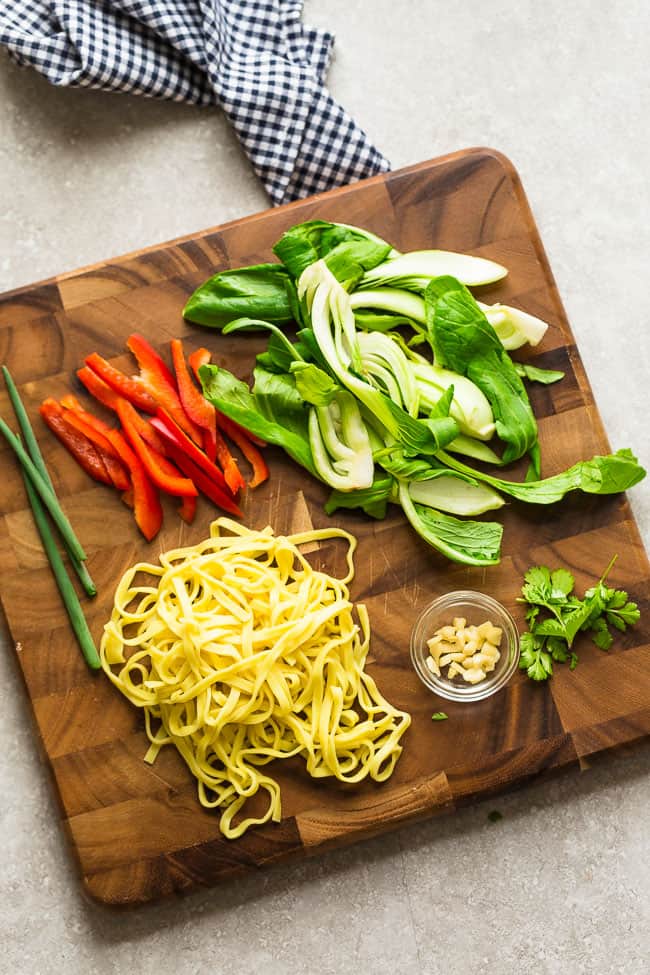
For the savory lo mein sauce
- Coconut Aminos – can subsitute with gluten free tamari or reduced sodium soy sauce if not following Whole30/paleo.
- Apple cider vinegar – may sub with rice wine vinegar if not Whole30/paleo.
- Coconut sugar – a low glycemic paleo sweetener that mimics the taste of brown sugar and adds a nice sweetness to this healthy lo mein sauce. If you want to make this sauce keto, then sub with granulated monk fruit sweetener or use homemade date paste or apple juice for Whole30 sauce
- Sesame oil – adds the signature nutty flavor found in traditional recipes
- Arrowroot powder– we love use this grain-free starch in place of cornstarch to help thicken up the sauce, but you can substitute with xanthan gum for low carb / keto diets
- Water – to mix with the arrowroot powder
Other ingredients
- Homemade Vegan Oyster Sauce OR this storebought Vegan Oyster Sauce – sub with Primal Kitchen’s No Soy Teriyaki Sauce for paleo / Whole30 or regular oyster sauce if no dietary preferances
- Red Boat Fish sauce – optional, but if you already have it in your pantry, give it a try – it adds that extra rich umami flavor – for vegetarian sub with Miso paste OR Vegan Fish Sauce which can you buy on Amazon or directly from their site.
- Chili garlic paste
- Bean sprouts
How to make Vegetable Lo Mein Noodles
Making healthy vegetable lo mein at home couldn’t be easier. Be sure to follow the step-by-step instructions, photos or watch the video below.
- PREPARE THE NOODLES: Cook or prepare noodles according to package directions. Drain and set aside.
- WHISK INGREDIENTS: After the noodles are prepared, whisk together all the ingredients for the sauce. Set aside.
- COOK THE CHICKEN: Heat 1 tablespoon oil in a large non-stick wok or skillet on medium-high heat. Plate chicken in pan and cook until browned on both sides, about 5-6 minutes. Transfer chicken to plate and set aside.
- SAUTE THE VEGETABLES: Add remaining oil to the same skillet, add garlic and ginger and cook for 30 seconds, until fragrant. Combine red peppers, carrots, snow peas (bok choy) and cook for 1-2 minutes, until tender crisp.
- MIX INGREDIENTS: Add prepared noodles and cooked chicken breasts back into the same pan. Pour the sauce over noodles, toss and coat well, using tongs.
- THICKEN THE SAUCE & SERVE: Turn the heat high to allow the sauce to bubble and thicken and add more water if the sauce is too thick. Season with salt and black pepper. Toss again and serve immediately and sprinkle with green onions and sesame seeds if desired.
Variations and Tips for making the Best Lo Mein
- Add in cooked – chicken, beef, pork, shrimp and fried tofu work great in here.
- Not a fan of bok choy or cabbage? No problem – leave them out or swap them for snap peas and spinach instead.
- For extra saucy noodles, feel free to double the sauce recipe.
- If you cannot find fresh (Asian market) or dry lo mein noodles (usually in the International section of Target, Sprouts, Trader Joe’s, Whole Foods, or large chain grocery store), then you can swap with any gluten-free noodle or shirataki noodles.
- Prep – chop all the vegetables ahead of time and store in an airtight container the night before.
Make ahead, reheating and storage instructions
The best part about making lo mein is that it works perfect for meal-prep especially if you make a double batch.
- To make ahead: Cook your noodles the day before. Mince or chop the garlic, ginger and wash and cut the vegetables the day before. Store in the fridge in separate containers or resealable bags.
- How long does Lo Mein last in the fridge? You can store this delicious dish in the refrigerator for up to 5 days. Be sure to allow the noodles to cool down then transfer to airtight containers,
- How to reheat lo mein: When you’re ready to enjoy your leftover lo mein noodles, it’s best to either sauté it in a wok or pan on medium low heat over the stove or in a microwave-safe bowl in the microwave.
Meal prepping
We love to make this lo mein recipe for weekly meal preps! Vegan lo mein is a one-pan dinner recipe that is easy to make in huge batches that will last the entire week and perfect for packing in school or work lunches.
Let your noodles cool then pack into meal prep containers. We like these glass containers for home and these lunch containers for school and work. Pack with your favorite side – Jasmine rice, brown rice, cauliflower rice or spiralized vegetables – zoodles.
Serving suggestions
Homemade vegetable lo mein is delicious on its own or serve it with:
Is lo mein healthy?
Lo Mein that you make at home is definitely healthier than any takeout lo mein that you order from any North American Chinese restaurant. Our recipe includes a soy-free option but we also have these Low Carb Noodles that is perfect for anyone that is following a grain-free or Whole30, paleo, low carb or keto diet.
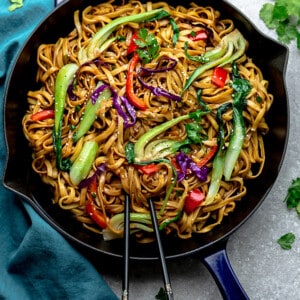
This Vegetable Lo Mein is an authentic family recipe made with silky noodles stir-fried with bok choy, cabbage, carrots and red bell peppers paired with a savory Asian-inspired sauce! So easy to make at home in under 30 minutes in just one pan. Gluten-free and includes grain-free, low carb, keto, vegan and paleo options.
- 6 ounces dry lo mein noodles , for grain-free diets these can be swapped with Jovial Grain-Free Cassava Spaghetti Pasta, Cappello's Grain Free Spaghetti Almond Flour Pasta , Cappelo's Grain Free Fettuccine Almond Flour Pastaor Palmini Noodles made from Hearts of Palm Pasta. You can also use Shirataki/ Konjac noodles. These noodles from Miracle Noodleare what we like to use. Spiralized vegetable noodles work, too, like cooked spaghetti squash or these zucchini noodles.
- 3 Tablespoons cooking oil , divided
- 2 garlic cloves minced
- 1/2 teaspoon minced fresh ginger
- 1 red bell pepper cut into thin strips
- 1/3 cup shredded carrots
- 1/2 cup bok choy , cut into strips
- 1/4 cup shredded red cabbage OR swap with an other vegetables
- salt and black pepper to taste
- 1/3 cup coconut aminos , can sub with gluten free tamari or regular soy sauce if not following a gluten free diet
- 3 Tablespoons vegan oyster sauce , use this Homemade Vegan Oyster Sauce OR this storebought Vegan Oyster Sauce - sub with Primal Kitchen's No Soy Teriyaki Sauce for paleo / Whole30 or regular oyster sauce if no dietary preferences
- 1 tablespoon apple cider vinegar , may sub with rice wine vinegar if not Whole30/paleo/keto.
- 2 teaspoons coconut sugar , if you want to make this sauce keto, then sub with granulated monk fruit sweetener or use apple juice or homemade date paste for Whole30
- 2 teaspoons sesame oil
- 2 Tablespoons arrowroot powder , can substitute with corn starch if no dietary concerns or with 1/2 tsp xanthan gum for low carb / keto
- 2/3 cup water , plus more as needed to thin out sauce
- 1 teaspoon Red Boat fish sauce optional, but if you already have it in your pantry, give it a try - it adds that extra rich umami flavor - for vegetarian sub with Miso paste OR Vegan Fish Sauce
- 1/2 teaspoon dark soy sauce , optional & only if you have it in your pantry - it adds extra richness and darker color. Leave out for paleo / whole30
- 1-2 teaspoons chili garlic paste , red pepper chili flakes or Sriracha sauce - optional or to taste
- Cook noodles according to package directions. Drain and set aside.

- While the noodles are cooking, whisk together all the ingredients for the sauce. Set aside.

Heat 1 tablespoon oil in a large non-stick wok or skillet on medium-high heat. Add garlic and ginger and cook for 30 seconds, until fragrant. Add red peppers, carrots, bok choy and cabbage and cook for 1-2 minutes, until tender crisp.

Add drained noodles back into the same pan. Pour the sauce over noodles, toss and coat well, using tongs. Turn the heat high to allow the sauce to bubble and thicken and add more water if the sauce is too thick. Season with salt and black pepper. Toss again and serve immediately and sprinkle with green onions and sesame seeds if desired.

- For meal prep, divide the noodles into separate lunch containers.

Double the sauce recipe for extra saucy noodles
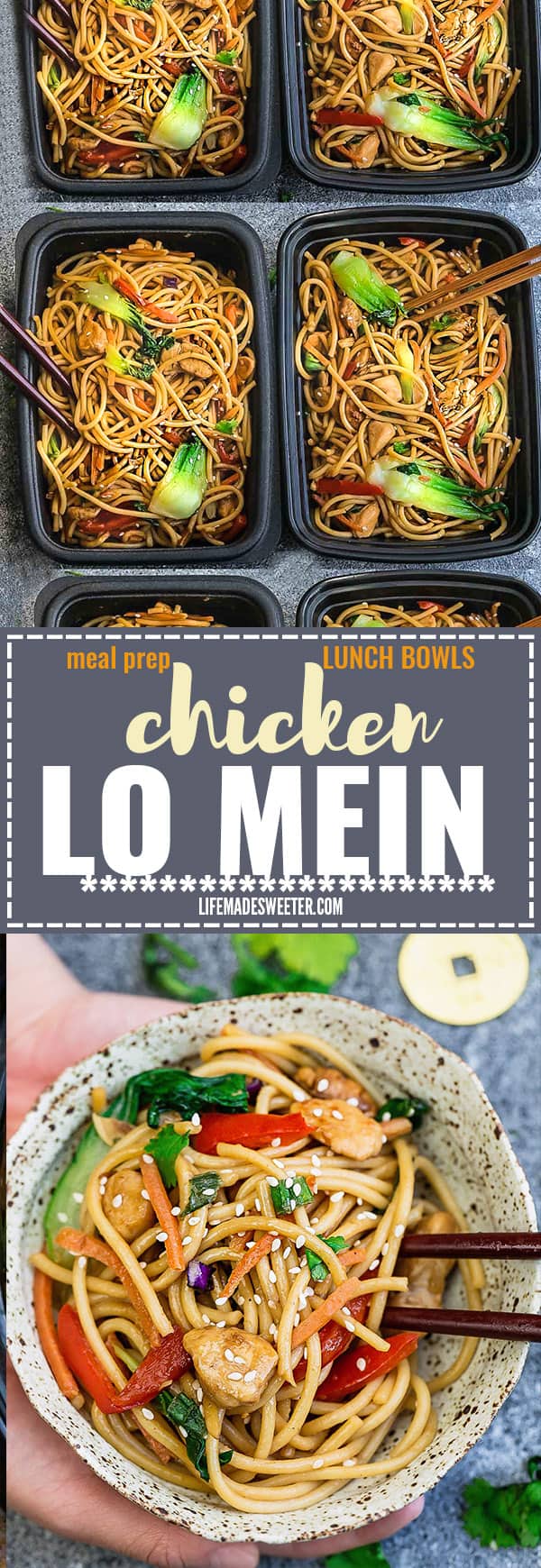

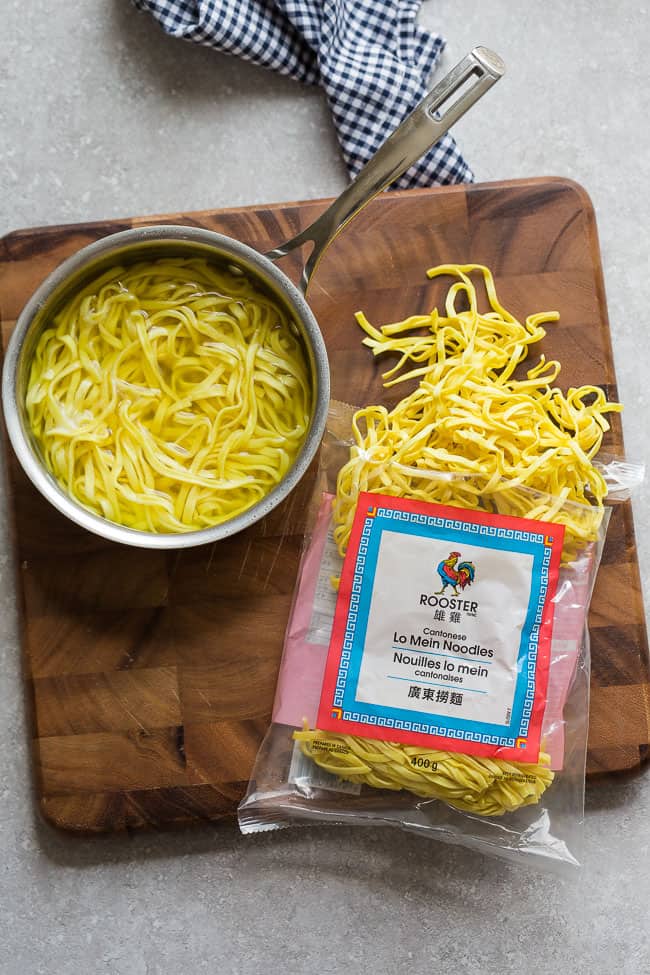
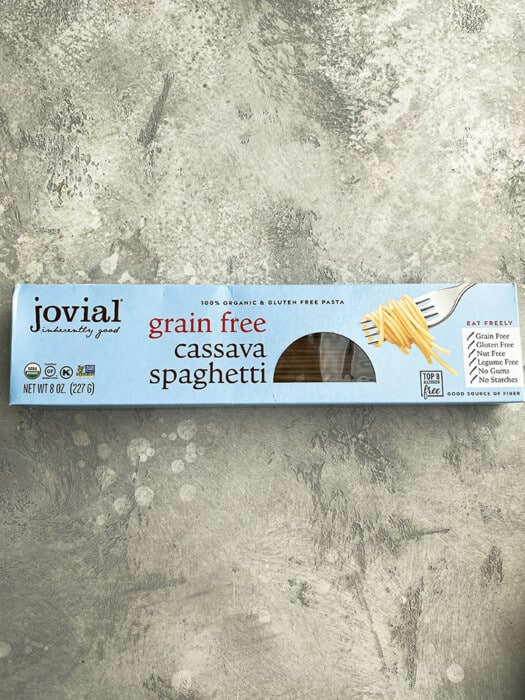

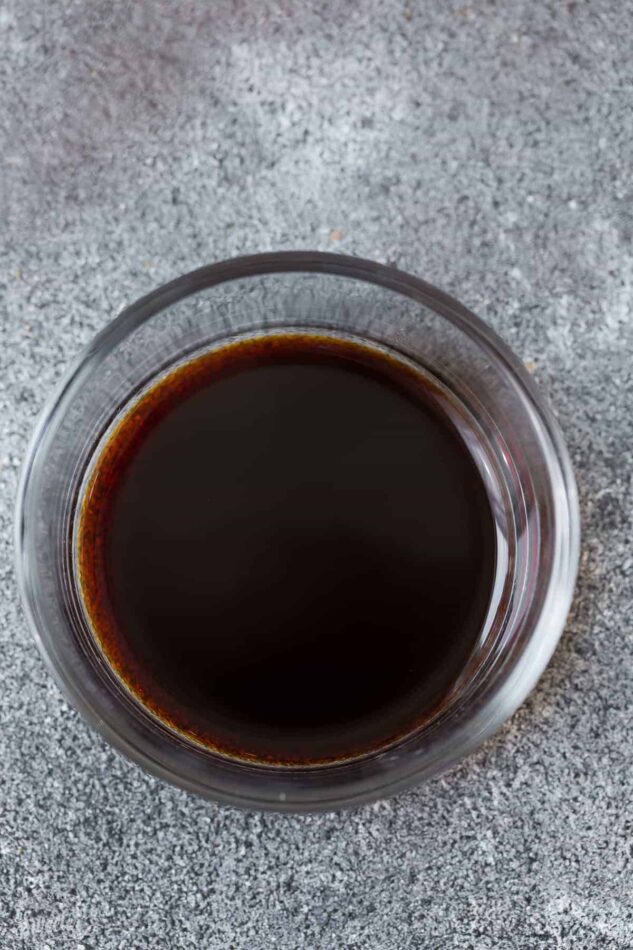
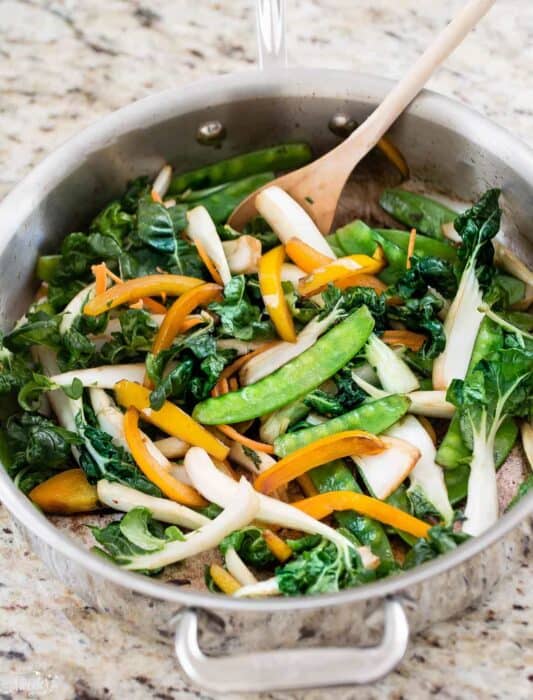
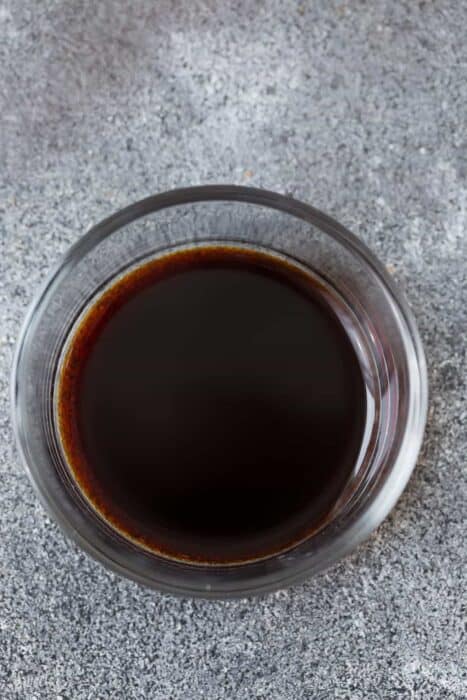
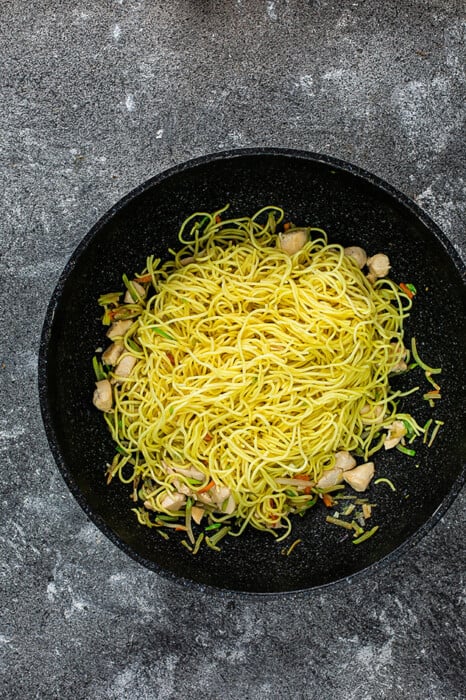
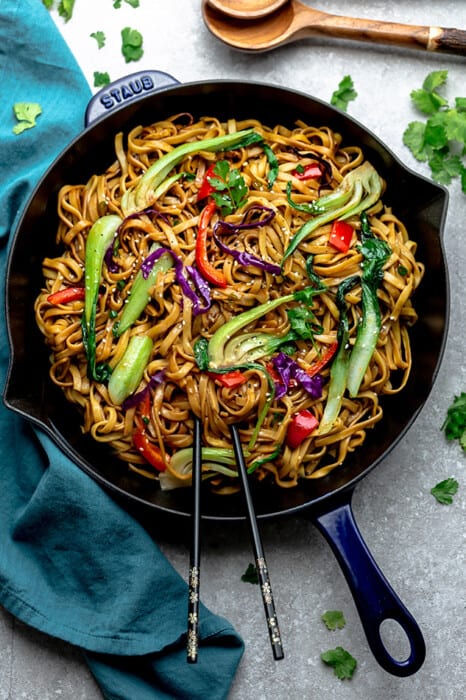
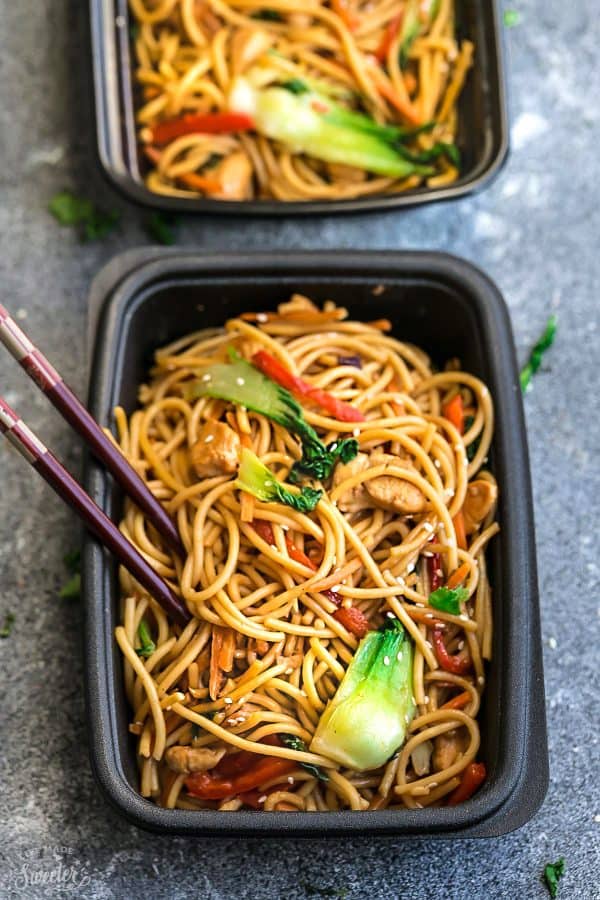
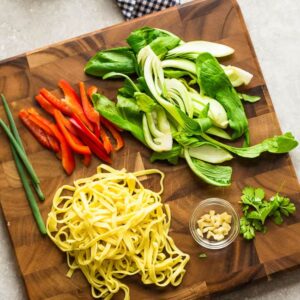
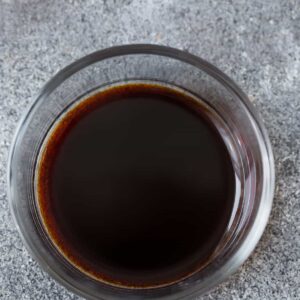
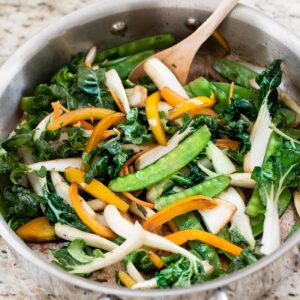
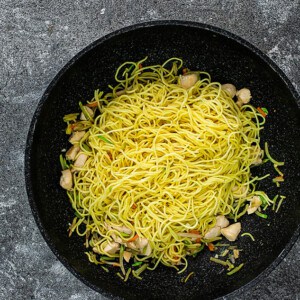
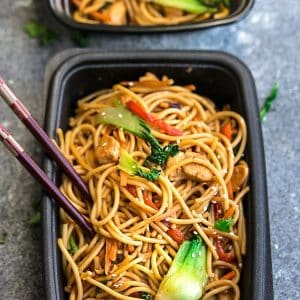
 Did you try this recipe?
Did you try this recipe?






Sabrina -
thank you for this recipe, I’d like to swap in zucchini noodles with it as one of the options you suggest, a nice vegetable option as lo mein instead of as a vegetable side dish